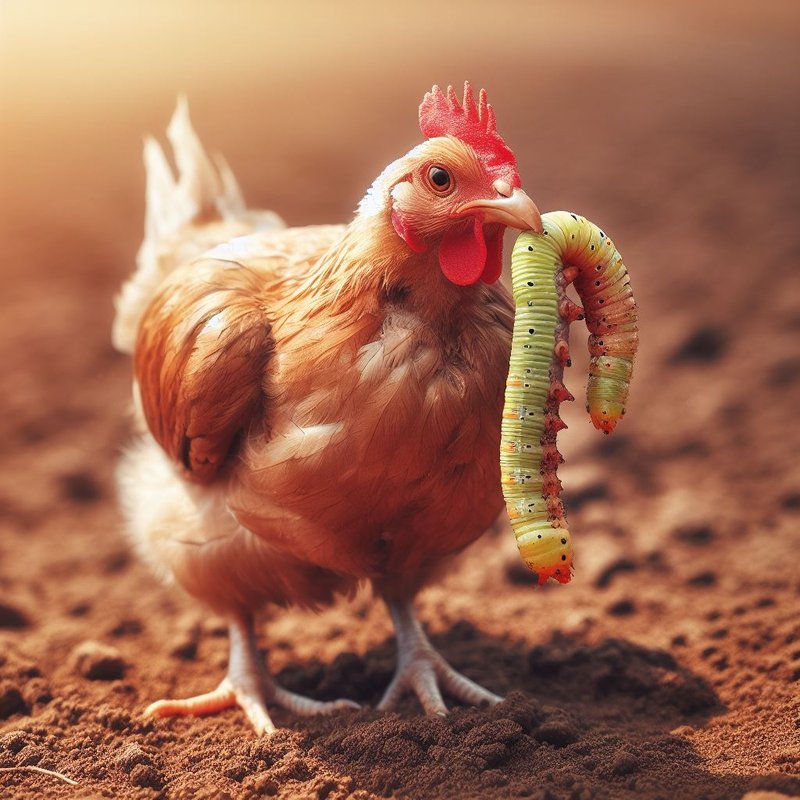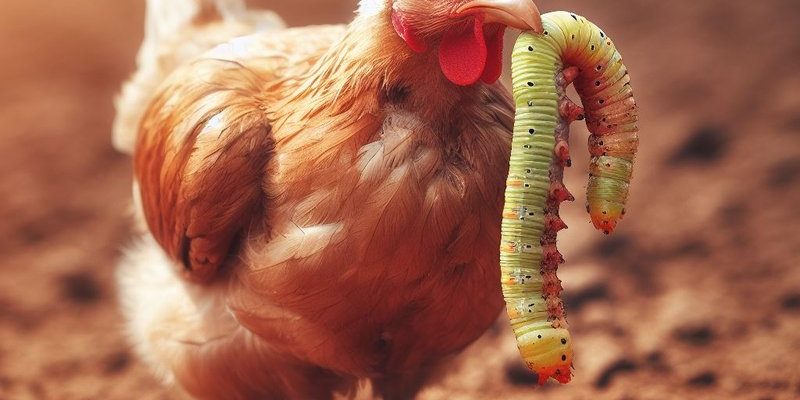
Using chickens to control hornworms isn’t just a smart idea; it’s also a natural one. Chickens eat these caterpillars and can help keep their populations in check without the need for harsh chemicals. Think of it as a symbiotic relationship: you grow the plants chickens love to snack on, and in return, they keep your garden healthy. It’s a win-win! So, let’s dive into how you can effectively use chickens to tackle those pesky hornworms and keep your garden thriving.
Understanding Hornworms: The Garden Menace
Before we get into the chicken tactics, it’s essential to know what you’re dealing with. Hornworms are the larvae of sphinx moths. They can grow to about 4 inches long and are typically bright green, making them blend in well with the leaves they munch on. You might see them primarily on tomato plants, but they also have a taste for peppers and eggplants.
These little guys can do significant damage before you even notice they’re there. A single hornworm can devour a whole tomato plant overnight! That’s like having a party guest who doesn’t know when to stop eating. That kind of destruction is why catching them early is critical.
Identifying Hornworms in Your Garden
Recognizing hornworms can save your plants from severe damage. Look for their thick, green bodies, often adorned with a distinctive horn-like protrusion. They also leave behind telltale signs: small frass (poop) pellets and significant leaf damage. If you spot these signs, it’s time to call in reinforcements—your chickens!
You might be wondering how chickens will help. Well, chickens are natural foragers and love to peck at bugs, including hornworms. Just imagine letting your feathery friends roam around your garden, gobbling up hornworms like they’re candy on Halloween night.
Preparing Your Garden for Chickens
Before introducing chickens into your garden, a little preparation goes a long way. First, make sure your garden is chicken-friendly. This means ensuring they have plenty of space to roam but also protecting your plants from overzealous pecking.
You might want to create designated areas or paths for your chickens so they can access the pest problem without trampling your precious seedlings. Raised beds can work well, as they provide a clear boundary for chickens to roam while keeping your plants safe from too much attention.
Choosing the Right Chicken Breeds
Not all chickens are created equal. Some breeds are better for pest control than others. For instance, **the Rhode Island Red** and **the Sussex** are known for their excellent foraging abilities. They enjoy scratching around in the dirt, hunting for insects, and will quickly learn that hornworms are a delicious snack.
When choosing your chickens, consider your garden size and the space you have available. It’s also essential to think about their personalities. Some chickens are more social and forgiving than others, so choose breeds that will mesh well with your gardening style.
Feeding Chickens for Optimal Pest Control
While chickens will instinctively hunt for hornworms, you can also support their health and pest-catching enthusiasm through proper feeding. A balanced diet rich in protein ensures your chickens are at their best when foraging. Consider supplementing their diet with grains and kitchen scraps, but they should still have free access to forage in the garden.
A healthy chicken that feels good will be more active and better at finding those sneaky hornworms hiding among your tomato plants. Think of it as fueling up your chicken soldiers before sending them into battle!
Timing is Everything
Timing plays a crucial role in how effectively your chickens can control hornworms. Begin introducing chickens to your garden as soon as you start seeing signs of hornworm activity. They work best when they can catch these pests early on. If you wait too long, hornworms might multiply beyond what your chickens can handle.
Also, consider the life cycle of hornworms. They can emerge in waves, so check your plants regularly and keep your chickens on their toes! Regularly rotating your chickens through different areas of your garden can help as well, as it keeps them active and engaged in pest control.
Benefiting from Chickens: Beyond Hornworms
Using chickens isn’t just about hornworm control; they provide other benefits too. Chickens naturally fertilize the soil with their droppings, adding nutrients that plants love. Plus, their scratching helps aerate the soil, promoting healthy root growth. It’s like having a built-in garden assistant!
Additionally, chickens can help control other pests, such as slugs and beetles. This diverse pest management strategy can lead to healthier plants and a more productive garden overall.
Staying Vigilant: Monitoring Your Garden
Even with chickens on lookout duty, it’s essential to maintain your garden vigilance. Regularly inspect your plants for any remaining hornworm activity. You can assist your chickens by removing any larger hornworms you spot, making it easier for them to focus on those that are better hidden.
Consider keeping a log of when you see hornworms and how your chickens respond. This practice helps you track patterns, allowing for better pest management strategies in the future. Remember, the more you know about your garden’s specific pest challenges, the better equipped you’ll be to handle them.
Closing Thoughts: The Chicken and Garden Connection
Using chickens to help control hornworms is a natural, effective strategy that not only protects your plants but enriches your gardening experience. Chickens bring life to your garden, acting as tiny pest control agents while also adding nutrients to the soil.
By preparing your garden, choosing the right breeds, and feeding them properly, you’ll foster a thriving ecosystem right in your backyard. So, why not give it a shot? Embrace your inner chicken whisperer and let your feathered friends help keep those hornworms at bay. Happy gardening!

